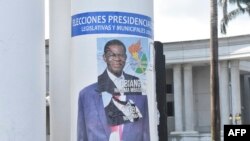Equatorial Guinea, Africa's only Spanish-speaking country, goes to the polls Sunday with 80-year-old President Teodoro Obiang Nguema running for a sixth term.
Obiang came to power in a 1979 military coup and, with 43 years in power, is the world's longest-serving head of state.
Some 425,000 Equatorial Guineans will be eligible to vote in the election, in which Obiang is being challenged by Buenaventura Monsuy and Essono Ondo Andress. The country will also hold parliamentary and local elections.
Tutu Alicante, the head of EG Justice, a nonprofit organization that promotes human rights and democracy in Equatorial Guinea, told VOA that on election day, government representatives in villages and towns force voters to cast ballots for the ruling party.
He's 'not going to leave'
“I am confident that the incumbent president will win re-election," he said. "I don’t have to be a supporter of the president to know that; I just have to be an observer of this kleptocratic government. This government has stayed in power by manipulating people’s votes, stealing votes, by rigging elections. ... Obiang is not going to leave power; it is not Obiang’s interest to leave power. Obiang knows the minute he leaves power, that minute he will face prosecution internally and outside Equatorial Guinea.”
Obiang's government is accused of conducting widespread abuse of critics and using the country’s oil to enrich the president.
The plan to run for the sixth time has been criticized by civil society groups, opposition groups and lawyers, leading to more arrests.
Obiang wins elections with over 90 percent of the vote. Jeffrey Smith, the head of Vanguard Africa, a nonprofit organization that works on issues of free and fair election and ethical leadership, said Obiang uses the election to show how popular he is in the country but instills fear in his people to remain in power.
“It’s truly unbelievable, the figures that he puts out to the world in some way try to position himself as a popular leader when he is anything but, if you look at the resistance that has been taking place in the country and the complete iron first with which he rules," Smith said. "His people live in fear. They live in oppression.”
Freedom House, an organization that promotes human rights and democracy, ranks Equatorial Guinea as not free and says that despite the country's regular elections, the voting is neither free nor fair.
'Economic calculation'
Alicante said Obiang fears losing power.
“This is not an altruistic effort by Obiang to stay in power," he said. "It's just an economic calculation for Obiang, and as long as Equatorial Guinea remains profitable to him and his family, he is going to do anything to stay in power. So elections should go as usual. There will be a military at every polling station in Bata and Malabo, two capital cities, so anyone who goes to vote seeing the military will know exactly what paper they have to pick before they go into the booth.”
Smith said Western countries and multinational corporations are helping to make African leaders like Obiang remain in power for decades.
“It’s really a club of dictators in Central Africa, unfortunately, being subsidized not only by their natural resources but often by multilateral institutions including the World Bank and International Monetary Fund," he said. "And we cannot leave the United States out of this equation, as well. They have been unfortunately part of this international effort to uphold these horrendous, ruthless leaders in power.”
More work awaits Obiang if he wins the election, as the economy is struggling from the effects of the global pandemic and high food prices.





